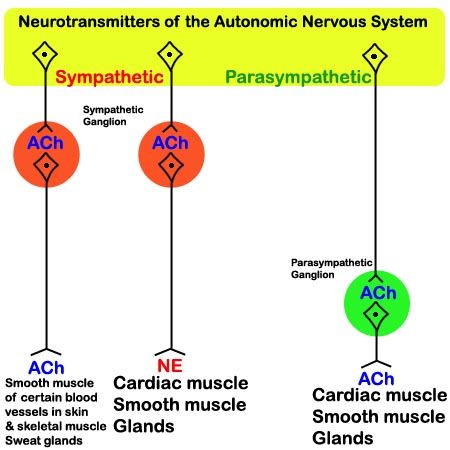Neurons in the Sympathetic Pathway Use Which Neurotransmitters
The sympathetic and the parasympathetic divsions. Describe the neurotransmitter receptor types and what synthesizes this in the sympathetic division.

Clinical Psychology Physical Therapy School Physiology
Upper motor neurons use glutamate while.

. In response to this stimulus the postganglionic neurons release norepinephrine which activates adrenergic receptors that are present on the peripheral target tissues. Neurotransmitter is secreted from the preganglionic neuron. The neurotransmitterreceptor combination at all ganglia is similar and is identical to that of the parasympathetic nervous system.
Both sympathetic and parasympathetic nerves. Autonomic varicosites Postganglionic autonomic neurotransmitters. D There are no enzymes to break down epinephrine and norepinephrine in the blood and very little in peripheral tissues.
Binding of a neurotransmitter to its receptor results in either an electric response excitatory or inhibitory or secondary messenger pathway that activates or suppresses the post-synaptic neuron. Many parasympathetic pathways originate in the brain stem and their axons leave the brain in several cranial nerves. The epinephrine and norepinephrine from the adrenal glands are released by sympathetic neurons whereas parasympathetic neurons release these substances at the effector organs.
The postganglionic neurons of parasympathetic are cholinergic similar to. While neurons are the functional cell of the nervous system they are not the only type of cell present. Receptor type on the target tissues Neurotransmitter is secreted from the postganglionic neuron.
Acetylcholine ACh is an excitatory neurotransmitter secreted by motor neurons that innervate muscle cells basal ganglia preganglionic neurons of the autonomic nervous system and postganglionic neurons of the parasympathetic and sympathetic nervous systems. Most sympathetic pathways originate in the thoracic and lumbar regions of the spinal cord parasympathetic neurons secrete acetylcholine onto muscarinic cholinergic receptors. The postganglionic neurons of sympathetic system are androgenic.
The postganglionic neurons of both sympathetic and parasympathetic nervous systems contain few differences. D There are no enzymes to break down epinephrine and norepinephrine in the blood and very little in peripheral tissues. Within autonomic fibers adrenergic neurons are exclusively found in postganglionic neurons of the sympathetic nervous system.
Adrenal medulla is important to the sympathetic branch of the autonomic nervous system because. This means these neurons use adrenaline noradrenaline as the neurotransmitters. The postganglionic neurons of sympathetic system are androgenic.
True for the sympathetic parasympathetic division. B Cells of the nervous system. True for both divisions The presence of two peripheral efferent neurons in a pathway is typical of the ________ division.
Which of the following characteristics is similar between the sympathetic and parasympathetic branches for most neurons. At the synapses within the ganglia preganglionic neurons release acetylcholine a neurotransmitter that activates nicotinic acetylcholine receptors on postganglionic neurons. Sympathetic neurons secrete norepinephrine onto adrenergic receptors.
The upper and lower motor neurons together comprise a two-neuron pathway that is responsible for movement. Adrenergic neurons secrete norepinephrine and are found in both the central and autonomic nervous system. The postganglionic neurons of both sympathetic and parasympathetic nervous systems contain few differences.
Postganglionic fibers in the sympathetic division are adrenergic and use norepinephrine also called noradrenalin as a neurotransmitter. This is achieved by a complex interplay of neural efferent pathways humoral mechanisms and afferent pathways. This means these neurons use adrenaline noradrenaline as the neurotransmitters.
Most neurons in active pathways must remain in place for as long as possible. By contrast postganglionic fibers in the parasympathetic division are cholinergic and use acetylcholine as a neurotransmitter. Neurons generally do not undergo mitosis and instead remain in a senescent state for most of ones lifetime.
The neural pathway from the spinal cord to the target tissue has two neurons the preganglionic neuron and the postganglionic neuron. It is a source of catecholamines. The epinephrine and norepinephrine from the adrenal glands are released by sympathetic neurons whereas parasympathetic neurons release these substances at the effector organs.
The postganglionic neurons of parasympathetic are cholinergic similar to preganglionic neurons. Preganglionic neurons secrete acetylcholine which binds the nicotinic acetylcholine receptor on the postganglionic cell body. The neurotransmitter acetylcholine is released by neurons at the neuroeffector synapse.
The activation of target. The neural pathway from the spinal cord to the target tissue has two neurons the preganglionic neuron and the postganglionic neuron. _____ release neurotransmitter over the surface of target cells.
In this review we focus on recent progress within the past 10 years that has been made in the sympathetic control of arterial blood pressure with a special emphasis on the role of baroreceptor mechanisms and central neurotransmitters. The 2 subdivisions of the autonomic divsions of the nervous system are. Upper and lower motor neurons utilize different neurotransmitters to relay their signals.
Site of origin of the nerves.

Autonomic Receptors Autonomic Nervous System Nursing School Survival Medical School Studying

Sympathetic Nervous System Vs Parasympathetic Nervous System Parasympathetic Parasympathetic Nervous System Autonomic Nervous System

Ch 17 Lecture Presentation Parasympathetic 10 Things Pearson Education

Pin By Kayla Cindric On Nursing Thoracic Spinal Nerve Parasympathetic Nervous System

Autonomic Nervous System Anatomy Poster Etsy In 2022 Nervous System Anatomy Autonomic Nervous System Nervous System

Autonomic Nervous System Nervous System Sympathetic System

Comparison Of Neurotransmitters In The Autonomic Nervous System In The Parasympathetic Pathway Both The Autonomic Nervous System Acetylcholine Norepinephrine

Pin By Allison Merkey On Physiology Autonomic Nervous System Neurotransmitters Nervous System

Autonomic Nervous System Biology For Majors Ii Autonomic Nervous System Nervous System Anatomy Nervous System

Hand Drawn Ans Adrenergic Receptors Physiology Parasympathetic Nervous System

Peripheral Nervous System Autonomic Nervous System Nervous System Anatomy Nervous System

Powerpoint Presentation Autonomic Nervous System Nervous System Nervous

Associate Degree Nursing Physiology Review Peripheral Nervous System Autonomic Nervous System Parasympathetic Nervous System

Synaptic Neurotransmission In Cholinergic Preganglionic Neurons In Both The Sympathetic And Parasympathetic G Neurons Teaching Biology Adrenergic Receptors

Sympathetic Nervous System Pathway Autonomic Nervous System Nervous System Nervous

Nervous System Nervous System Autonomic Nervous System Nervous System Anatomy Nervous System

24 Ans Neurotransmitters Catos Block 2 Concept Map Neurotransmitters Pharmacology


Comments
Post a Comment